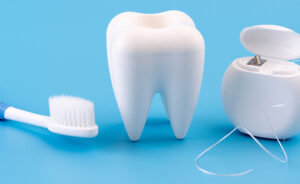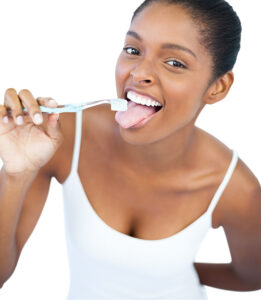1. Brushing too fast
brushing should be between 30 seconds and 2 minutes twice a day
You can damage enamel brushing too fast. Slow to moderate speed brush strokes is ideal.

2. Not Flossing
Flossing helps to remove bacteria hidden. In one corner we have gum disease and the other corner, the heavyweight champ, Floss! Gum disease affects mainly adults but can happen at an early age, especially if you don't have a proper oral care routine, which includes flossing every day. Floss comes out the winner!

3. Not using the right toothbrush
We recommend buying a chargeable electric toothbrush.
We realize that is not always an option, so we recommend using toothbrushes with soft bristles as these are much more effective. Avoid buying hard toothbrushes. These can damage tooth enamel and toss out toothbrushes after 2-3 months because they get rough. These can damage tooth enamel.
4. Not brushing your tongue
When brushing your teeth, brushing your tongue gently will rid
of bacteria that gets collected on your tongue called biofilm.
This type of bacteria can lead to bad breath and even tooth damage.
The tongue itself has peaks and troughs that are a perfect place for bacteria to thrive and settle. In fact, Its a leading cause of bad breath.
Let's brush those tongues and battle bacteria.

5. Not rinsing after brushing and flossing
Flossing and brushing is not enough. You can leave particles behind.
Rinsing is an important last step to brushing and flossing. Rinsing will
help rid of these excess particles.
6. Not drinking enough water
Drink plenty of water to avoid dry mouth
dry mouth can result in growth of bacteria and fungi which can,
in turn, lead to bad breath.

7. Frequently Snacking
An occasional treat is fine, but repeated sugar intake and other carbs will increase the risk of cavities. Sugar can stay stuck to your teeth.
These sugars can damage your teeth. Tooth decay is caused by bacteria in
the mouth using sugar from foods and drinks to produce acids that
dissolve and damage the teeth.
It's important to monitor and moderate children's sugar intake.

8. Eating Acidic food at night
The acid in the saliva can damage can affect the health of your gums.
It is said to be best to eat at least two hours before your bedtime.
We recommend brushing the teeth before bedtime. This will help to keep
your mouth clean of acids.
9. Waiting too long before your final brush time and bedtime
It is very important to brush right before you go to bed.
Cavities can develop and grow rapidly when the mouth is dry.
Bacteria will eat away at your teeth eventually creating
holes (cavities) and leaving you without your teeth.
Plaque is also an issue. It can harden to form tartar.
plaque and tartar cause irritation, inflammation, and bleeding of the gums,
as well as dental decay, also known as cavities.
Let's make sure to brush our teeth before bedtime.

Bottom:
This article is intended to provide an understanding and knowledge about
Oral hygiene mistakes to avoid. Always seek advice from a professional dentist with any questions you may have regarding your child and medical conditions or treatments.



